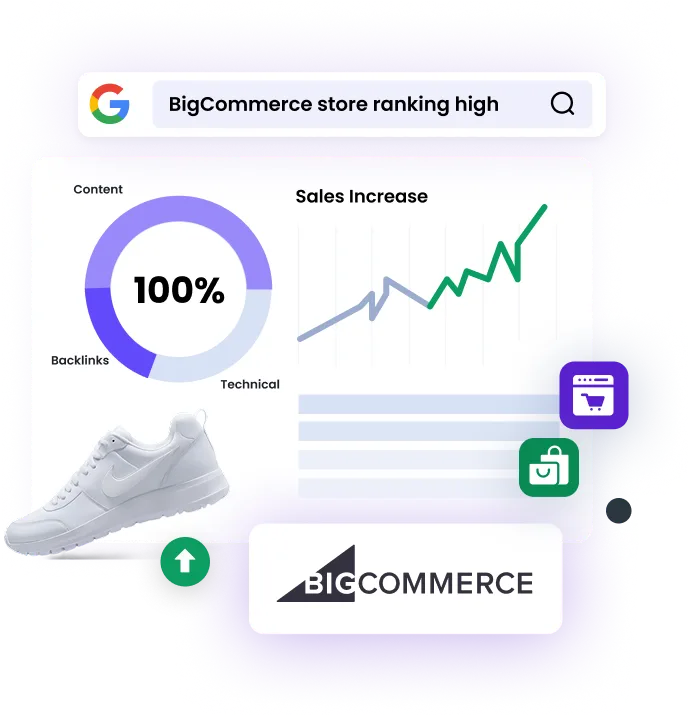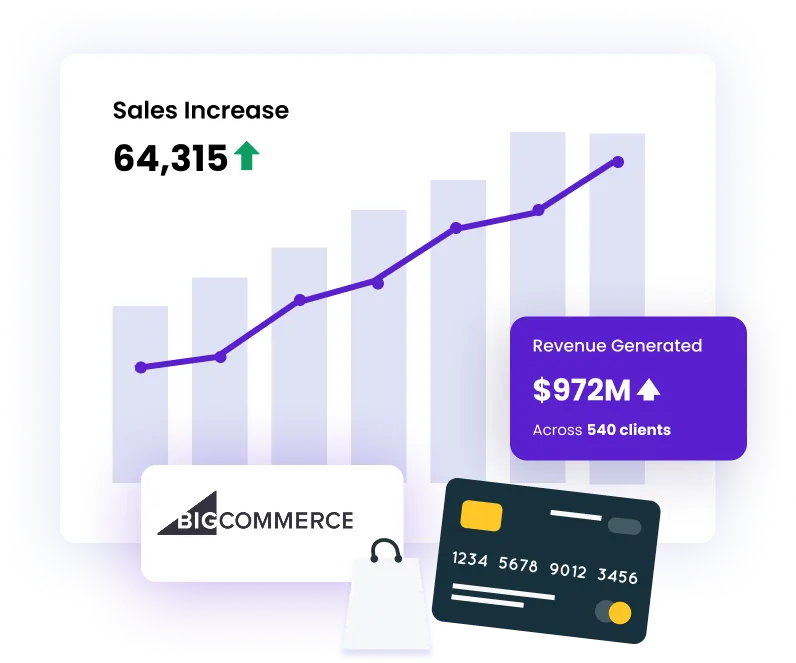







_logo%202.svg)




.svg)
Partner with our expert BigCommerce SEO agency to drive better organic search results for your website.
























Issue #1:
Duplicate Content from Product Variants
BigCommerce can unintentionally create duplicate content issues when products have multiple variants (like size or color), each generating its own URL. For example:
This results in multiple URLs for the same product, which can confuse search engines. Without proper management, Google may treat these as separate pages, splitting link equity and negatively affecting your rankings.
To fix this, we implement canonical tags on your BigCommerce product variant pages, ensuring Google knows which URL to prioritize. We also optimize the internal link structure to ensure all traffic and link equity flow to the correct page, preventing ranking dilution and maximizing SEO value for your BigCommerce store’s product pages.
Issue #2:
Slow Page Speed
BigCommerce sites have slower page speeds due to several factors:
These slowdowns frustrate users and harm your SEO performance. Since Google uses page speed as a critical ranking factor, poor performance can increase bounce rates, lower conversions, and negatively affect rankings.
To improve your BigCommerce store’s page speed, we guide your developers to optimize image sizes, eliminate redundant scripts, and streamline third-party app performance. Speeding up your BigCommerce store helps us boost rankings, enhance user experience, and increase conversions.
Issue #3:
Missing or Incorrect Schema Markup
Many BigCommerce stores don’t have the right schema markup or may set it up incorrectly.
Schema markup is special code that helps search engines understand important details about your products, like price, availability, and reviews. Without it, search engines may not show this key information in search results, which may lead to fewer clicks and missed sales opportunities.
We help you add the correct schema markup to your BigCommerce product and category pages. With the right schema markup, your BigCommerce products will appear more prominently in search results, leading to increased clicks, higher traffic, and ultimately, more sales.


















Meet the BigCommerce SEO experts with 1mln hours expertise



.svg)

.webp)





Read our case studies
.svg)

Purpose-built frameworks for BigCommerce themes, platform settings, and custom code
Comprehensive 150-point audit covering BigCommerce-specific issues like theme bloat, canonical conflicts, and page speed
Consolidates variant, tag, and filter URLs with smart canonicals and redirects to prevent content dilution
Implements detailed schema markup for product and collection pages, optimizing for rich results
Optimizes speed by removing unused code, compressing images, and improving script performance
Audits all apps for SEO performance, removing slow or irrelevant apps and recommending SEO-friendly alternatives
Secures high-quality backlinks from BigCommerce-specific sources, industry blogs, and digital PR placements
Live performance tracking with GA4, SEO tools, and Search Console, alongside weekly strategy calls
Uses a one-size-fits-all SEO approach across platforms
Misses BigCommerce-specific technical issues like variant URLs and custom redirects
Ignores URL structure conflicts and doesn’t address them at scale
Uses basic schema plugins that may not be fully optimized for BigCommerce
Basic image compression and theme tweaks
Often overlooks the impact of apps on site speed and SEO
Uses generic link-building strategies with limited relevance
Provides basic traffic reports with limited actionable insights
Knows the brand and platform but lacks specialized BigCommerce SEO expertise
Needs external support for advanced SEO diagnosis and fixes
Aware of issues but lacks tools and time to implement fixes at scale
Can add schema manually but often lacks bandwidth for thorough implementation
Limited time and resources for full site speed optimization
Unable to evaluate or replace apps efficiently due to resource limitations
Inconsistent link-building without clear, strategic outreach
Tracks SEO performance but may not align directly with sales and conversion goals
%201.svg)


.svg)

.svg)

.svg)

.svg)
.svg)
.webp)
.webp)
.webp)
We have extensive experience working with BigCommerce. We've helped stores of various sizes optimize their product pages, improve their site speed, and implement effective SEO strategies.
We understand how BigCommerce's platform integrates with SEO best practices, and we know how to leverage its built-in features (like product feeds and metadata) to boost visibility in search engines.
Whether it’s managing large inventories or optimizing custom product pages, we are well-versed in optimizing BigCommerce stores for SEO.
One of the most common mistakes is neglecting the optimization of collection pages, which are key for ranking. Many BigCommerce store owners focus only on product pages, leaving category pages under-optimized.
Another mistake is duplicate content from product variants. BigCommerce often generates multiple URLs for a single product with different attributes (e.g., color or size). This can confuse search engines.
We also see stores with slow page load times due to unoptimized images or heavy apps. These issues all contribute to poor SEO performance and reduced rankings.
We fix all of this by making sure your BigCommerce store runs fast, has clean content, and is fully optimized to rank better in search results.
For stores with a large inventory, we prioritize product pages and collections that are most important to your business and drive the most revenue. We create strong internal linking to spread link equity throughout the site, helping search engines index more pages.
Also, we use bulk optimization tools to update metadata and automate product description optimization. This ensures every product gets the attention it needs, while improving the overall SEO performance of your site.
BigCommerce’s default collection pages often lack the content and structure needed for strong SEO performance. We improve these pages by adding unique, keyword-rich content that targets search queries specific to that collection.
We also optimize metadata (titles and descriptions) and ensure proper internal linking to relevant product pages. This ensures search engines understand the relevance of your collection pages and boosts their chances of ranking higher in search results.
First, we optimize your Google My Business (GMB) profile to ensure it’s up-to-date with accurate information like location, hours, and services.
We also focus on local keyword optimization, incorporating geo-targeted keywords into your product pages and content to ensure your store shows up for local searches.
Also, we build local citations by getting your store listed on relevant local directories, and we create location-specific content such as blog posts or landing pages to further target your local audience.
Lastly, we use local schema markup to help search engines understand the geographical relevance of your store and products.
Regarding international SEO for BigCommerce stores, we focus on localizing SEO elements, including language, currency, and content, to cater to different regions. This involves using hreflang tags to indicate regional content to search engines and ensuring every country or language version of your store is optimized for its local target market.
We also monitor local competition and customize your approach to stand out in each marketplace, whether that's through backlinks or regionally-specific keywords.
We follow a white-hat link-building approach to acquire high-quality backlinks from niche-relevant blogs, eCommerce, and SaaS websites. This includes tactics like guest posting, niche edits, blogger outreach, and digital PR campaigns.
We make sure that any links we build are from authoritative sources that genuinely add value. The goal is to increase your store’s domain authority, which helps improve product rankings and organic traffic over time.
SEO is a long-term strategy, so results can vary depending on the competitiveness of your market, the current state of your website, and the specific goals you have.
Usually, it takes about 3 to 6 months to start seeing noticeable improvements in rankings and traffic. Within 6 to 12 months, you can notice more significant results.
You can see early signs of progress, such as improved rankings for targeted keywords or increased organic traffic, within the first 3 months. However, consistent growth and achieving higher rankings for more competitive keywords usually takes time.
For BigCommerce stores, SEO leads to increased rankings for high-converting keywords, which directly translates to more traffic and more sales. Depending on the competitiveness of your industry, the results might start showing in 3 to 6 months, and you could see up to a 50-100% increase in organic traffic over a year with consistent efforts. The great thing about SEO is that it continues to provide value over time without the need for constant ad spend, making it a cost-effective long-term strategy.